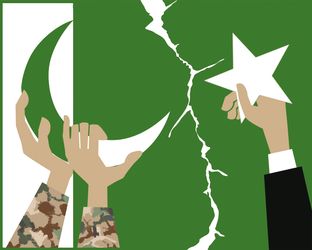The Germans have a word for it: schadenfreude, that is, delighting in another’s troubles. In India, there is considerable schadenfreude over the mess in Pakistan, where everything—politically, economically and in foreign policy—seems to have gone wrong at the same time. The civil polity is hopelessly divided, with the army threatening to bring back order once again through the barrel of a gun. The economy is in the doldrums. Pakistan has ceased to be the springboard for determining the outcome in Afghanistan. The world has lost interest in Afghanistan but not the Taliban in wanting to dismantle the Durand Line. And India merely scoffs at Pakistan’s increasingly frenetic rhetoric that seeks to refocus world attention on Kashmir. The world is not listening. And might the Chinese (“the all-weather friend”) turn Gwadar into a Hambantota, effectively snatching the strategic port away from Pakistani sovereignty to get themselves reimbursed for their humongous investment in the China-Pakistan Economic Corridor?
At just this juncture, our foreign minister has chosen to be rude to the point of crudeness to his Pakistani counterpart in the latest instalment of a personal quarrel that Jaishankar sparked in New York and got back as good as he gave. Is this in our long-term interest? What do we gain from Pakistan’s collapse? More, to the point, is Pakistan collapsing?
Pakistan came into being because the Muslim elite, in large measure, did not wish to become a minority in someone else’s dispensation. That sentiment constitutes the bonding adhesive of their nationhood. It makes Pakistanis more patriotic in times of crisis than when the going is good. In normal times, they enjoy mocking their leadership. But when the unity or integrity of their nation is threatened, they band together. We need to understand this.
We have seen in India, particularly in the ghastly era through which we are currently transiting, how “hurt religious sentiment” can be transmuted into political gain. Religion, the raison d’etre of the birth of Pakistan, can quickly and effectively be invoked if India is seen as taking advantage of Pakistan’s woes. The reaction in Pakistan to Jaishankar’s snarl at Bilawal in Goa only proves that the higher the level of India’s schadenfreude, the greater Pakistan is incentivised to come together. Of course, Jaishankar’s primary goal was to please his boss and establish his credentials as a true saffronite; but if he thought his huffing and his puffing is going to blow the Pakistan house down, his hopes will be belied for his rhetoric only solidifies Pakistan’s desire not to revert to being India. This in turn means that a turbulent Pakistan remains a neighbour of India and an indivisible part of our shared subcontinent. We cannot wish them way—and, therefore, should not.
Moreover, while Pakistan is no longer a key ally of the US and is being increasingly displaced by Joe Biden’s outreach to Modi, it is difficult to imagine the US looking away when the eighth largest country in the global community—Pakistan—is being dismantled against the will of Pakistanis. So, as in the past, so in the future, the Americans will grudgingly bail out their former partner, if only to stop China from becoming their sole benefactor. Hence, Pakistan will be helped to weather out this crisis.
Given that Pakistan is here to stay and has the potential to restore its broken polity and economy, what we have to decide is whether to continue our nearly decade-old disengagement with Pakistan. It is clear that if Modi wins in 2024, this disengagement will continue, but given the imperative necessity of uniting the opposition to forestall that outcome, at the appropriate time Pakistan policy has to be inserted consensually into the joint opposition agenda.
Aiyar is a former Union minister and social commentator.


